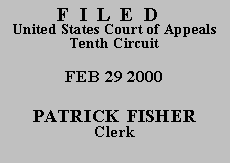

| CURTIS LEE WATSON,
v.
DONALD DORSEY, Warden, |
No. 99-2205
(D.C. No. CIV-99-0525-SC/RLP) |
The district court dismissed this case sua sponte pursuant to 28 U.S.C. § 1915(e)(2) and Fed. R. Civ. P. 12(b)(6). (See Doc. 8.) The court found that the circumstances of Watson's incarceration were temporary and only in effect while formal security classification proceedings were pending. (See id. at 2.) The court dismissed Watson's claims related to the circumstances of his confinement on the ground that he had no protected liberty interest in his security classification. (See id.) The court went on to dismiss Watson's claim that he was denied access to legal materials because Watson had failed to alleged any relevant actual injury. (See id.) Finding that Watson's claims arising under federal law lacked merit, the district court declined to exercise supplemental jurisdiction over Watson's state law claim concerning the breach of the settlement agreement pursuant to 28 U.S.C. § 1367(a) & (c). (See id. at 2-3.)
We review the district court's decision to dismiss a complaint pursuant to § 1915(e)(2)(B)(i) for an abuse of discretion, see Schlicher v. Thomas, 111 F.3d 777, 779 (10th Cir. 1997), and § 1915(e)(2)(B)(ii) de novo, see Perkins v. Kansas Dep't of Corrections, 165 F.3d 803, 806 (10th Cir. 1999). After thorough consideration of Watson's claims, we find that the district court properly dismissed the claims relating to Watson's security status and his access to legal materials for substantially the same reasons set forth in the order of the district court. We also find that Watson's claim that he was denied adequate medical care for the injury to his ankle is without merit because he has failed to state a cognizable Eighth Amendment claim by alleging "deliberate indifference to serious medical needs." Estelle v. Gamble, 429 U.S. 97, 106, 97 S. Ct. 285, 50 L. Ed. 2d 251 (1976). Because the district court properly dismissed Watson's federal law claims, we conclude that the district court did not abuse its discretion in declining to exercise supplemental jurisdiction over Watson's state law claim concerning breach of the settlement agreement. See Smith v. Enid, 149 F.3d 1151, 1156 (10th Cir. 1998) (explaining that we review a district court's decision to dismiss supplemental state law claims pursuant to § 1367(c) under an abuse of discretion standard). As a final matter, this court wishes to remind Mr. Watson that he has an ongoing obligation, pursuant to an order of this court dated October 18, 1999, to make partial payments toward the $105 in court costs and fees assessed in connection with this suit. AFFIRMED.
The mandate shall issue forthwith.
ENTERED FOR THE COURT
David M. Ebel
Circuit Judge
*.After examining appellant's brief and the appellate record, this panel has determined unanimously that oral argument would not materially assist the determination of this appeal. See Fed. R. App. P. 34(a)(2) and 10th Cir. R. 34.1(G). The case is therefore ordered submitted without oral argument. This Order and Judgment is not binding precedent, except under the doctrines of law of the case, res judicata, and collateral estoppel. The court generally disfavors the citation of orders and judgments; nevertheless, an order and judgment may be cited under the terms and conditions of 10th Cir. R. 36.3.